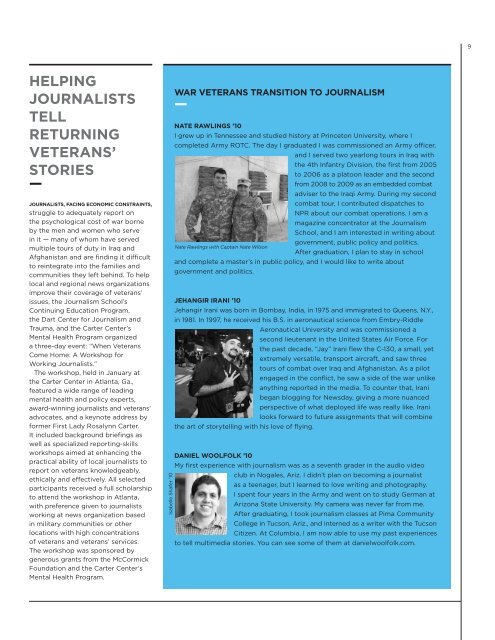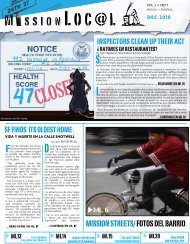Columbia Journalism sChool Winter 2010 - Berkeley Graduate ...
Columbia Journalism sChool Winter 2010 - Berkeley Graduate ...
Columbia Journalism sChool Winter 2010 - Berkeley Graduate ...
Create successful ePaper yourself
Turn your PDF publications into a flip-book with our unique Google optimized e-Paper software.
helPing<br />
JournaliSTS<br />
Tell<br />
reTurning<br />
veTeranS’<br />
STorieS<br />
—<br />
JournaliSTS, FaCing eConomiC ConSTrainTS,<br />
struggle to adequately report on<br />
the psychological cost of war borne<br />
by the men and women who serve<br />
in it — many of whom have served<br />
multiple tours of duty in Iraq and<br />
Afghanistan and are finding it difficult<br />
to reintegrate into the families and<br />
communities they left behind. To help<br />
local and regional news organizations<br />
improve their coverage of veterans’<br />
issues, the <strong>Journalism</strong> School’s<br />
Continuing Education Program,<br />
the Dart Center for <strong>Journalism</strong> and<br />
Trauma, and the Carter Center’s<br />
Mental Health Program organized<br />
a three-day event: “When Veterans<br />
Come Home: A Workshop for<br />
Working Journalists.”<br />
The workshop, held in January at<br />
the Carter Center in Atlanta, Ga.,<br />
featured a wide range of leading<br />
mental health and policy experts,<br />
award-winning journalists and veterans’<br />
advocates, and a keynote address by<br />
former First Lady Rosalynn Carter.<br />
It included background briefings as<br />
well as specialized reporting-skills<br />
workshops aimed at enhancing the<br />
practical ability of local journalists to<br />
report on veterans knowledgeably,<br />
ethically and effectively. All selected<br />
participants received a full scholarship<br />
to attend the workshop in Atlanta,<br />
with preference given to journalists<br />
working at news organization based<br />
in military communities or other<br />
locations with high concentrations<br />
of veterans and veterans’ services.<br />
The workshop was sponsored by<br />
generous grants from the McCormick<br />
Foundation and the Carter Center’s<br />
Mental Health Program.<br />
Isabelle Shafer ’10<br />
War veTeranS TranSiTion To JournaliSm<br />
—<br />
naTe raWlingS ’10<br />
I grew up in Tennessee and studied history at Princeton University, where I<br />
completed Army ROTC. The day I graduated I was commissioned an Army officer,<br />
Nate Rawlings with Captain Nate Wilson<br />
and I served two yearlong tours in Iraq with<br />
the 4th Infantry Division, the first from 2005<br />
to 2006 as a platoon leader and the second<br />
from 2008 to 2009 as an embedded combat<br />
adviser to the Iraqi Army. During my second<br />
combat tour, I contributed dispatches to<br />
NPR about our combat operations. I am a<br />
magazine concentrator at the <strong>Journalism</strong><br />
School, and I am interested in writing about<br />
government, public policy and politics.<br />
After graduation, I plan to stay in school<br />
and complete a master’s in public policy, and I would like to write about<br />
government and politics.<br />
Jehangir irani ’10<br />
Jehangir Irani was born in Bombay, India, in 1975 and immigrated to Queens, N.Y.,<br />
in 1981. In 1997, he received his B.S. in aeronautical science from Embry-Riddle<br />
the art of storytelling with his love of flying.<br />
Daniel WoolFolk ’10<br />
Aeronautical University and was commissioned a<br />
second lieutenant in the United States Air Force. For<br />
the past decade, “Jay” Irani flew the C-130, a small, yet<br />
extremely versatile, transport aircraft, and saw three<br />
tours of combat over Iraq and Afghanistan. As a pilot<br />
engaged in the conflict, he saw a side of the war unlike<br />
anything reported in the media. To counter that, Irani<br />
began blogging for Newsday, giving a more nuanced<br />
perspective of what deployed life was really like. Irani<br />
looks forward to future assignments that will combine<br />
My first experience with journalism was as a seventh grader in the audio video<br />
club in Nogales, Ariz. I didn’t plan on becoming a journalist<br />
as a teenager, but I learned to love writing and photography.<br />
I spent four years in the Army and went on to study German at<br />
Arizona State University. My camera was never far from me.<br />
After graduating, I took journalism classes at Pima Community<br />
College in Tucson, Ariz., and interned as a writer with the Tucson<br />
Citizen. At <strong>Columbia</strong>, I am now able to use my past experiences<br />
to tell multimedia stories. You can see some of them at danielwoolfolk.com.<br />
9



